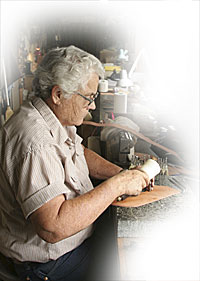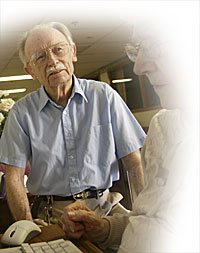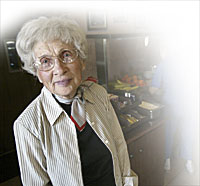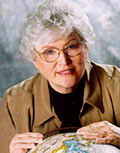

By Sandy Zaugg

“I don’t even own a rocking chair,” Paul Miller chuckles. “I want to do things.”
The 1960 graduate and his wife, former Walla Walla College student Mary (Budd), have been dairy farmers in Vermont for more than 40 years. These days, their sons do the milking and care for the 200 cows, while Paul and Mary travel with other volunteers for the nonprofit Christian organization, Maranatha Volunteers International. They’ve helped build churches in Peru and the Dominican Republic and schools in Nova Scotia and Venezuela. They have even worked in Cuba with the evangelistic program called “Changing People’s Lives.”
While working hard on these construction projects, Paul also records the trips with his camera. Photography has been his hobby, and much more, for many years. His photos have been published in the magazine Vermont Life and in various agriculture magazines. Paul’s focus has shifted in recent years, however. Now when he and Mary return from a Maranatha trip, they give programs for retirement and nursing homes. As Paul says, “We just want to tell people we’re doing something.”
 |
| When not tending to ranch chores, carol shultz is busy crafting leather goods for customers around the country. |
Carol Shultz, also a 1960 graduate, retired from teaching high school to become a rancher in the mountains of central Idaho. The 1,600 acres with 30 miles of fences keep her very busy, but Carol still finds time to work in her leather shop. She crafts everything from leather purses to belts; however, her specialty is leather chaps, which she makes for customers as far away as Alaska. Carol often does not end her workday until after 8 p.m. “I haven’t found a job yet that I’ve liked better than retirement,” she says.
Paul Miller and Carol Shultz are good examples of people who stay active and involved right into retirement. With the first crop of baby boomers about to retire, there’s some pretty sound advice they can follow for the years ahead.
The British Medical Journal recently published a study showing that seniors who enjoy life and are productive have reduced stress and a sense of personal worth and belonging. Not surprisingly, the researchers urge people to start well before retirement to build friendships and also relationships with family members. Experts also encourage retirees to join committees and clubs or do volunteer work where a person can make new friends, as well as keep in touch with old ones.
Not only can retirees feel happier, but Psychological Science notes that by being helpful to others, people can even reduce their risk of dying by more than 50 percent compared to their peers who aren’t productive or emotionally supportive. That’s great news in the face of the alarming study that a high percentage of men die within two years of retiring if they don’t have something to look forward to and a good reason to get up in the morning. The message here is clear: retire from the job, but not from life.
For many people who are already retired, what makes life interesting is the option of picking and choosing what to do. Becoming a volunteer gives a person a good chance to try new things, and volunteer opportunities are endless. For instance, Global Missions, an outreach ministry of the Seventh-day Adventist Church, would be nonexistent without volunteers. The alumni offices of most colleges and universities use volunteers. Elementary schools are discovering the importance of having grandparent figures spending time in their classrooms. Museums, symphonies, county fairs, community centers, small tv stations, and animal shelters all use volunteers.
 |
| James Stirling introduces fellow residents of the Napa Valley Retirement Estates to the digital world with computer lessons. |
When 1960 and 1966 graduate C. Keith Gibbons and his wife, former wwc student Elizabeth Barlow, retired from teaching, they found many reasons to keep getting up in the morning. Keith pastored a small church in northeast Montana for three years. Now the couple is often found at Walla Walla General Hospital helping patients and staff. In fact, Keith is there most mornings very early to guide patients to their destinations before other, sleepier volunteers are even out of bed.
Ann McKay (Barbara Ann MacIsaac), a 1962 graduate, is a retired nurse in Cleburne, Texas, who sometimes still does private duty nursing for close friends who need help. She is also involved with her local church, the symphony orchestra nearby in Ft. Worth, and community projects. This is in addition to the upkeep of her yard and home—and an occasional trip to England.
These alumni have discovered that living a purposeful retirement life isn’t just about finding what needs to be done and doing it; it can also be about matching one’s hobbies with the needs of others. As people think about retirement, it is a good idea to take stock of hobbies—or the lack of them. A person who has worked outside the home for 40 years may be in for quite a shock when suddenly there is nowhere to go. For those who are married, a special problem arises. Couples may not be used to spending every day, all day long, with a spouse. Retired couples still may not want to spend all their time together, but there might be some hobbies of mutual interest that could even be turned into a second or third career.
Richard Hall, a 1950 graduate, retired after 25 years in Southeast Asia, but then travel really began for Richard and his wife, former wwc student Jean Watkins. They’ve left their home in Lebanon, Ore., 17 times—so far—to help out Adventist Development and Relief Agency workers in crisis situations. They stay from one to six months at a time, working in faraway places such as Somalia, Yemen, Sudan, Haiti, and Mozambique. In June they left again, this time returning to Sudan for three months. And in December they have a vacation planned—to Laos! Richard and Jean have served as missionaries there, so they have projects to check up on and guidance to give. According to Richard, they have learned “to see the importance of helping to change the world, one life at a time.”
 |
| Irene Lottman clocks in to not one, but two jobs. |
Melvin, a 1952 graduate, and Dorothy (Kuhn) Holm, a 1955 graduate, have spent part of their retirement taking mission trips to places like Mexico, El Salvador, Honduras, and Venezuela. Last year Mel and Dorothy kept up with their love of travel to spend a week on a cruise ship going up the Inside Passage to Alaska. They realize that work doesn’t end with retirement, but now they can have fun and name their own hours, choosing what they want to do in this world.
Alumna, Louise (Hudson) Rea, a 1951 graduate, has taken her hobby of hiking to a whole new level. A retired business education teacher, she has explored all 33 trailheads around the Eagle Cap Wilderness, which includes the Wallowa Mountains. In 2000, she published the guidebook Quick Trips to the Wallowas, telling how to locate the trails. Now she gives slide shows, helps hikers plan trips, and keeps the book updated and stocked on store shelves.
Norma (Stratton) Green, a 1960 graduate, no longer teaches full-time but remains available to substitute. She is also able to spend many of her days taking her father to his medical appointments. Norma is a much-in-demand storyteller for the Seventh-day Adventist churches in the Portland, Ore., area and a master quilter. Her husband, Rodney A. Green, a former wwc student, now drives a moving van for the Oregon Conference of Seventh-day Adventists. He is looking forward to retirement so he can pursue his love of gardening.
For some alumni, living in a retirement home affords opportunities they might not have otherwise. With housing and food taken care of, some residents have found meaningful ways to serve others and even have a part-time job. At age 92, Irene (Pannett) Lottman, a 1935 graduate, clocks in to not one, but two jobs at the Napa Valley Retirement Estates. She is the hostess for supper in the dining room and also answers the facility’s phones from 6-10 p.m. The Seventh-day Adventist-owned retirement home is conveniently located just across the street from the Signs Memorial Seventh-day Adventist Church in Yountville, Calif. Here, Lottman is on the church’s social committee.
 |
| With a name befitting her role, Rose Reuer heads her church’s flower committee. |
The church’s location makes it possible for another resident to volunteer for her church. Rose Reuer, a 1945 and 1951 graduate, heads the church’s flower committee.
James Stirling, a 1944 graduate, who lives at the retirement estates with his wife, Maryan att., volunteers even closer to home.
For several years he has given fellow residents computer lessons. Using a computer that was donated to the facility, Stirling introduces computer newcomers to today’s digital tools. Stirling has used computers for 23 years, providing him with expertise he uses on occasion to even resolve computer issues for the administrators of the retirement estates. “I make good use of my computer,” he says. He also makes use of his computer as the editor of a Napa Valley computer club newsletter and associate editor of the magazine Adventist Today.
Once freed from the grind of the everyday trip to office or classroom, former full-time employees are pursuing new interests, expanding old hobbies, reaching out helping hands and remembering that life is what you make it, so make it meaningful.
“To me, that’s the key to retirement,” says Carol Shultz, the Idaho rancher and leather crafter. “I’m doing what I love and I’m having the time of my life.”
 And
Me?
And
Me?
Author Sandy Zaugg, a 1963 graduate, author,
and teacher, practices what she preaches.
Sure, there are rotten things about getting old, but retirement isn’t one of them. I decided a long time ago that with the Lord’s help my own retirement wasn’t going to be wasted on sitting around feeling sorry for myself. So now my life is full of all kinds of experiences—some exciting, some rather tame, but all interesting.
Volunteering has given me a chance to try some new things and meet new people. For several years I produced a newsletter for our local American Cancer Society, something I’d never done before. Now I’m spending two or three half-days per month in the gift shop of the Walla Walla General Hospital. And believe me, that’s a dangerous place for a grandmother to work! Too many temptations. But I’ve never run a cash register before, so each time I go it’s an adventure.
I keep in touch with friends by inviting them to go out to lunch with me. After all, even my more former colleagues at Walla Walla College still take time out to eat in the middle of the day.
My granddaughter is only eight and that’s a marvelous age to bond with. When I visit her in California, we go to museums, to lunch, to baseball games, and to bookstores. Actually, our favorite activity is going to the little airport in Riverside. We order a soda and fries, and eat at an outdoor table to watch small planes practice take-offs and landings, or taxi right up to us so the pilots can eat, too.
And in my spare time? I write books—mostly adventure books for children—and teach English short term in just about any country that pays my way to go there. For four months I taught English in the Philippines. Then I spent three months in Shanghai teaching in a language school. In February I returned from teaching college writing at Hong Kong Adventist College for six months. In November I’m going back to do it again.
I don’t know how long I’ll keep doing this, but recently Pacific Press published a biography I wrote about a very active lady who’s almost thirty years older than I am! With her example, I’m planning on a long, interesting, productive retirement.Sandy Zaugg has worked at Walla Walla College as a writing teacher, women’s dean, and teacher of English-as-a-second-language. She has also taught at the elementary and high school levels. One of her current projects is writing four books for the series “Adventist Girl” published by the Pacific Press Publishing Association. She lives in College Place.